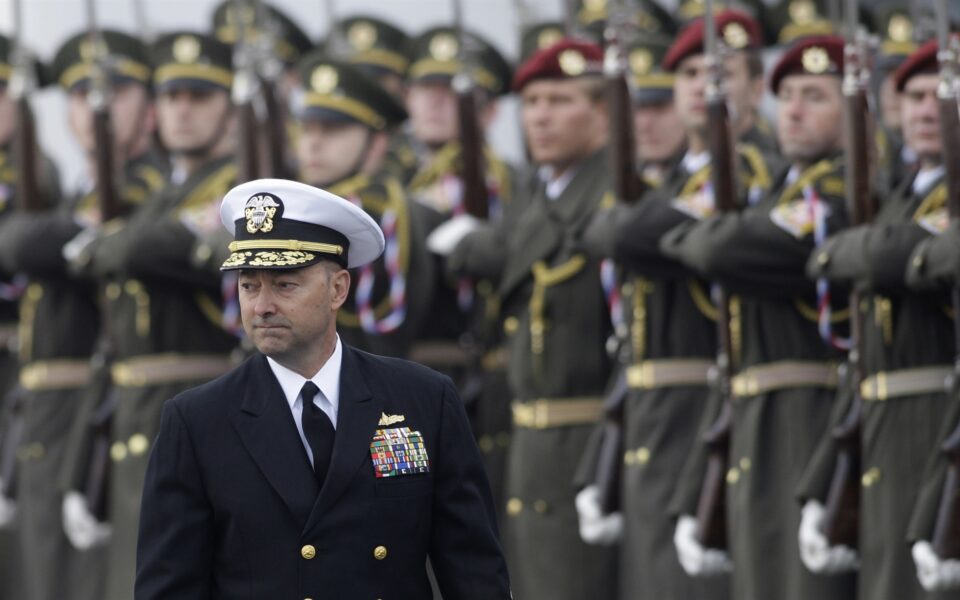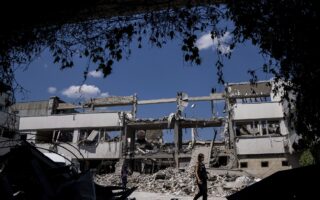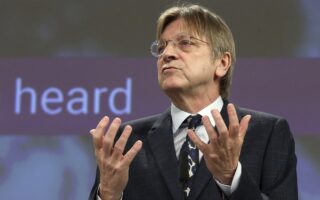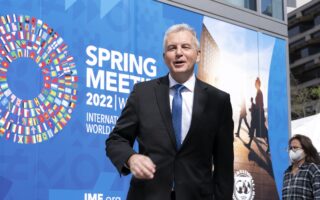Turkey is the main obstruction to NATO unity
Fully driving Russia out of all occupied territories in Ukraine will be a tall order, says former military head of Alliance

Turkey is the main point of dissonance in the unity of the Western Alliance against the Russian invasion of Ukraine, according to retired admiral James Stavridis. Speaking exclusively to Kathimerini, the former head of NATO forces in Europe (SACEUR) between 2009 and 2013 expresses the hope “that we will not reach the point where the Alliance is essentially forced to choose between Turkey or Sweden and Finland.” He calls for cool heads to prevail, but warns Ankara that the patience of the remaining 29 NATO members on this matter “has its limits and support for the Swedish and Finnish membership is very strong.” Otherwise, he welcomes the decision to send Western tanks to Ukraine and considers that the time has come to start the discussion about sending fighter aircraft, including F-16s. “Our job in the West is to continue to give the Ukrainians what they need to be in the best possible position when the time for the inevitable negotiation comes, hopefully within this year,” he notes.
What is your take on the solution that seems to be emerging on tank deliveries? Are you surprised the US moved on Abrams tanks? Was Chancellor Scholz’s aim to lead from behind?
Germany’s aim has always been to get as much overall allied support to the tank effort as possible, and they have succeeded well. In addition to the British Challenger tanks, they have convinced the US to send more than 30 of the formidable Abrams tanks. Added to that will be dozens if not hundreds of Leopards from across Europe (and perhaps French Leclercs). This will be a powerful and capable armored force.
Are you surprised at the persistently different approaches to the war taken by countries of Western versus Eastern Europe?
From my perspective here in Washington, the differences are not great. The entire Alliance is moving more or less in unison in continuing to expand the level and capability of aid to the Ukrainians. Humanitarian aid is also flowing smoothly to desperate Ukrainians barbarically attacked by the Russians in a vicious series of war crimes. The only obstruction I see is from Turkey, which continues to drag its feet on allowing Sweden and Finland to formally join the Alliance. But overall, the cooperation and unity of the West has been remarkable.
US General Mark Milley said a few days ago that “it will be very difficult” to remove Russian forces from Ukraine’s territory this year. Others, like Ben Hodges, former commanding general of the US Army in Europe, are more bullish. Where do you stand?
I hope we don’t arrive at the point where the Alliance is essentially forced to choose between Turkey or Sweden and Finland
I agree with General Milley that fully driving Russia out of all occupied territories will be a tall order. It is not impossible, especially if Russia’s logistics performance on the battlefield continues to be so terrible. But in Crimea in particular, the Russians are dug in deep and have no intention of withdrawing. So our job in the West is to continue to give the Ukrainians what they need to end up in the best possible position when the inevitable negotiation comes, hopefully this coming year. A good next debate, in that regard, would be whether to give the Ukrainians advanced combat jet aircraft (MiG-29s, F-16s), which is a remaining gap in their capability.
How concerned are you about a failed Russia as a source of global instability in case it decisively loses the war?
I am very concerned about Russia’s continuing march towards becoming an international pariah state. Whether they are eventually pushed entirely out of all aspects of the international system depends on the decisions going forward. If, God forbid, Putin chose to actually use a tactical nuclear weapon, his remaining support in the international community would evaporate. On the other hand, if he enters good-faith negotiations, there could still be path back for Russia. Let’s hope he makes good decisions.
Turkey continues to block Finland and Sweden’s accession to NATO and has been critical in limiting the effect of Western sanctions on the Russian economy. In your recent column in Bloomberg, you wrote about the possibility of Turkey leaving NATO, saying that would be a mistake. But do the benefits for the Alliance of having Turkey inside still outweigh the costs of its obstructionism and its autonomous foreign policy? Would a re-elected President Erdogan be any more cooperative?
I hope we don’t arrive at the point where the Alliance is essentially forced to choose between Turkey or Sweden and Finland. We are not at that point yet, and we should wait until the political season in Turkey is completed in the spring election. But the patience of 29 nations is not infinite in this regard, and there is enormous support in the rest of the Alliance to bring in the Swedes and the Finns. This is a good time to let temperatures cool, see what comes of the Turkish election, then evaluate how we go forward. Bottom line, I am confident Sweden and Finland will be in the Alliance this year.
Are you confident that under the new Congress, US support for Ukraine will continue unabated?
I am very confident of continued US support across both parties. While there will be some complaining on the margins, both right and left, the vast majority of lawmakers understand that this is a once-in-a-generation fight for freedom, democracy and the rule of law. Letting Russia invade and conquer a neighboring country is a chilling, terrible example that would lead to many other aggressive actions by other actors globally. Better to stop Russia than to open the door to much more global bad behavior. I’m confident we’ll be able to do just that.
The non-Western world, including its biggest players (China, India, Brazil) but also most of Africa, continue to view the war through a very different lens compared to the Western Alliance. How do you account for this? Has the West done enough to win hearts and minds?
Many countries try to draw a false comparison between the US invasion in Afghanistan and Iraq and the Russian attack on Ukraine. But the cases are totally different: The US and NATO reacted after being attacked by terrorists based in Afghanistan. The invasion of Iraq was a mistake based on faulty intelligence concerning nuclear weapons in that country. But remember Saddam Hussein often boasted of his capabilities and was clear in his hatred of the US, stemming from our defeating him after his unwarranted invasion of Kuwait. In the case of Russia, this is simply an invasion without a single military provocation, driven by a desire to conquer a neighboring country with rich resources – much like Saddam Hussein’s attack on Kuwait. The West needs to do a better job of explaining these differences. It needs to provide the basic logic of why we are defending Ukraine as a democratic nation unjustly attacked; to point out we have no desire to have an expanded war with Russia; and shine a light on the atrocities Russia is committing in Ukraine – the torture, the raping, the wanton destruction of civilian targets and critical infrastructure.





